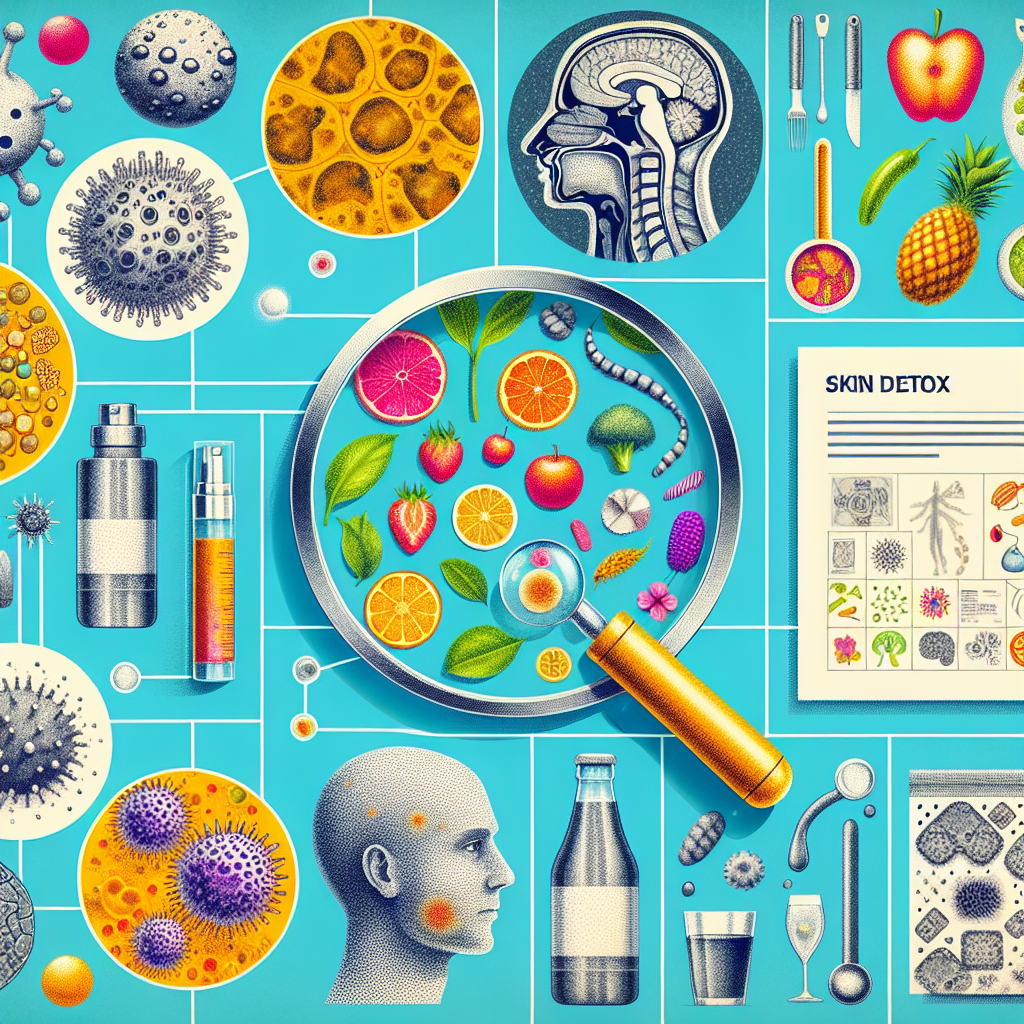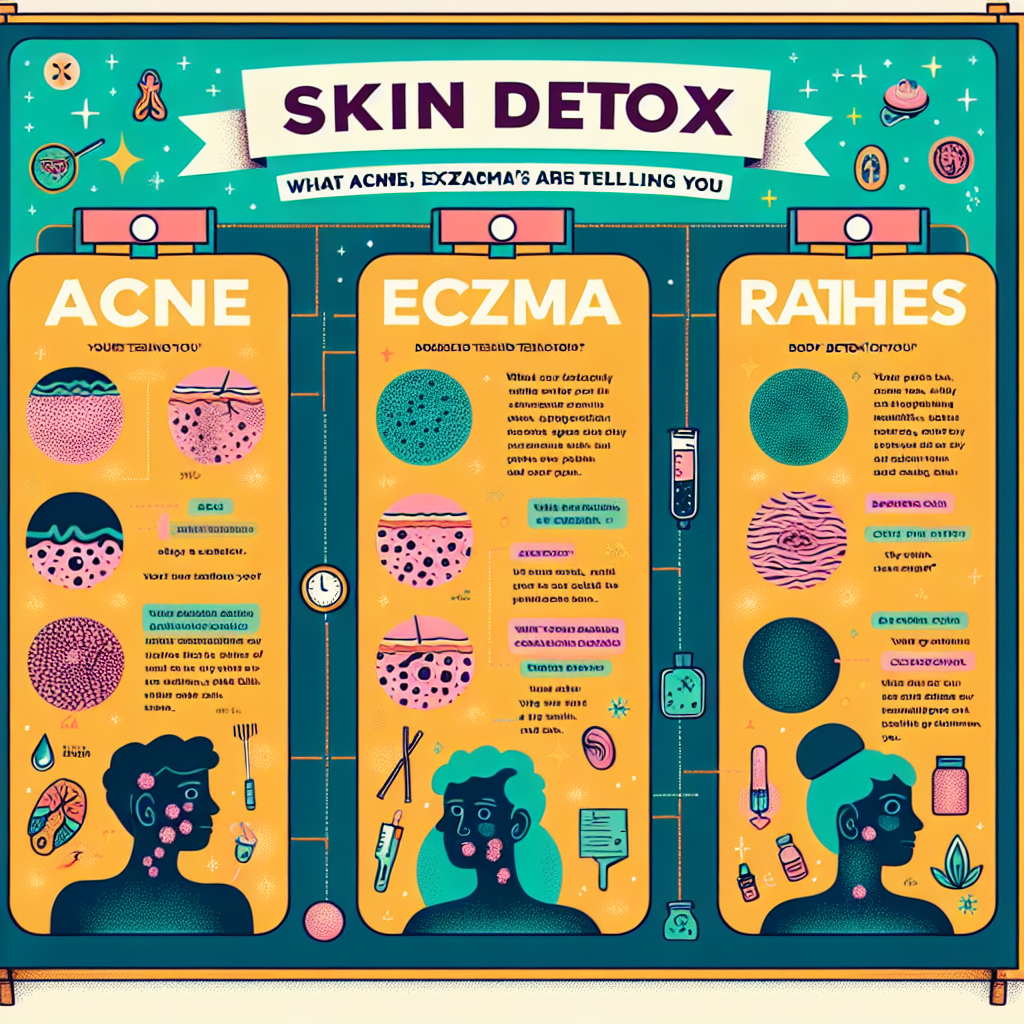Skin Detox: What Acne, Eczema, and Rashes Are Telling You

Discover what your acne, eczema, and rashes are trying to tell you about your skin’s health. Learn more about skin detox and how it can help you achieve clearer, healthier skin. Don’t ignore the signs your skin is giving you. Visit My Vibrant Vitality now to start your journey towards better skin health.
Understanding the Messages: What Acne, Eczema, and Rashes Reveal About Your Skin’s Health
Skin detoxification is a topic that has gained significant attention in recent years, particularly in relation to conditions such as acne, eczema, and rashes. These skin conditions are often viewed as mere cosmetic issues, but they can actually serve as important indicators of your skin’s overall health. By understanding the messages these conditions are sending, you can take proactive steps to improve your skin’s health and appearance.
Acne, for instance, is a common skin condition that affects millions of people worldwide. While it’s often associated with hormonal changes during adolescence, it can also occur in adulthood. Acne is typically caused by the overproduction of oil and the buildup of dead skin cells, which can clog pores and lead to inflammation. However, it’s important to note that acne can also be a sign of underlying health issues. For example, persistent acne can indicate hormonal imbalances, poor diet, or even stress. Therefore, addressing these root causes can be an effective way to improve your skin’s health and reduce acne breakouts.
Similarly, eczema, a condition characterized by dry, itchy, and inflamed skin, can also provide valuable insights into your skin’s health. Eczema is often linked to an overactive immune system response to irritants, which can result in inflammation and skin barrier dysfunction. This condition can be triggered by various factors, including allergens, irritants, and stress. However, it’s also worth noting that eczema can be a sign of a compromised immune system or gut health issues. Therefore, managing eczema often involves addressing these underlying health concerns, in addition to using topical treatments.
Rashes, on the other hand, can be caused by a wide range of factors, from allergic reactions to infections. They can appear as red, itchy, swollen, or blistered skin, and can occur anywhere on the body. Like acne and eczema, rashes can also serve as indicators of your skin’s health. For instance, a persistent rash can be a sign of an ongoing allergic reaction, an autoimmune disorder, or even a chronic illness. Therefore, it’s crucial to identify and address the root cause of the rash to improve your skin’s health.
In conclusion, acne, eczema, and rashes are more than just skin-deep issues. They can provide valuable insights into your skin’s health and can serve as indicators of underlying health concerns. By understanding the messages these conditions are sending, you can take proactive steps to improve your skin’s health. This may involve making dietary changes, managing stress, or seeking medical advice to address potential health issues. Remember, your skin is the largest organ in your body, and its health is a reflection of your overall well-being. Therefore, taking care of your skin is an essential part of maintaining good health.
Decoding Skin Problems: The Connection Between Acne, Eczema, Rashes and Skin Detox

Skin detoxification is a topic that has gained significant attention in recent years, particularly in relation to common skin conditions such as acne, eczema, and rashes. These conditions, often viewed as mere inconveniences, can actually serve as important indicators of our body’s overall health and its need for detoxification.
Acne, a condition that affects millions of people worldwide, is often associated with hormonal imbalances or poor hygiene. However, it can also be a sign of a body in need of detoxification. When our bodies are overloaded with toxins, our liver, which is responsible for detoxification, can become overwhelmed. As a result, these toxins can end up being expelled through our skin, leading to inflammation and the formation of acne. Therefore, persistent acne could be a sign that your body is struggling to eliminate toxins effectively.
Similarly, eczema, a condition characterized by dry, itchy, and inflamed skin, can also be linked to the body’s detoxification process. Eczema is often associated with an overactive immune system that reacts aggressively to irritants. This overreaction can be triggered by an accumulation of toxins in the body. When the body is unable to efficiently detoxify, it can respond by creating inflammation in the skin, resulting in eczema. Thus, recurring eczema could be your body’s way of signaling a need for detoxification.
Rashes, too, can be indicative of a body in need of detoxification. Rashes are often a sign of an allergic reaction, which can occur when the body is overloaded with toxins and reacts by creating inflammation in the skin. This inflammation can manifest as a rash, signaling that the body is struggling to eliminate toxins.
The connection between these skin conditions and the need for detoxification underscores the importance of maintaining a healthy lifestyle. A balanced diet, regular exercise, and adequate hydration can support the body’s natural detoxification processes. Consuming foods rich in antioxidants, such as fruits and vegetables, can help to neutralize toxins in the body. Regular exercise promotes circulation and helps to eliminate toxins through sweat. Adequate hydration supports kidney function, another key player in the body’s detoxification process.
In addition to these lifestyle changes, there are also specific skin detoxification methods that can be beneficial. These include dry brushing, which can stimulate the lymphatic system and help to eliminate toxins, and using skincare products with natural ingredients that can support the skin’s natural detoxification process.
However, it’s important to remember that while skin detoxification can help to alleviate these conditions, it’s not a cure-all solution. Acne, eczema, and rashes can also be influenced by genetic factors, stress, and other health conditions. Therefore, it’s always recommended to consult with a healthcare professional or dermatologist to understand the underlying causes of your skin problems and to develop a comprehensive treatment plan.
In conclusion, acne, eczema, and rashes can be more than just skin-deep issues. They can be signs that your body is in need of detoxification. By understanding this connection, you can take proactive steps towards improving your skin health and overall well-being.
The Hidden Language of Skin: Interpreting Acne, Eczema, and Rashes as Signs of Detox Needs
Our skin, the largest organ in our body, is a complex and dynamic system that serves as a barrier against environmental hazards, regulates body temperature, and plays a crucial role in our immune system. However, it also serves as a mirror, reflecting our internal health. Acne, eczema, and rashes are not just skin-deep issues; they are often signs of deeper health concerns that need to be addressed. Understanding the hidden language of our skin can help us interpret these signs and guide us towards the necessary detoxification processes.
Acne, a common skin condition that affects millions worldwide, is often associated with hormonal imbalances, but it can also be a sign of a congested liver. The liver is our primary detoxification organ, and when it’s overloaded with toxins, it can result in hormonal imbalances that manifest as acne. A diet high in processed foods, alcohol, and unhealthy fats can contribute to liver congestion. Therefore, a liver detox, which includes consuming liver-supporting foods like leafy greens, beets, and cruciferous vegetables, can help clear up acne.
Eczema, on the other hand, is an inflammatory skin condition that often signals an overactive immune system. It’s commonly linked to food sensitivities or allergies, gut health issues, and stress. The gut-skin connection is particularly significant, as research shows that an imbalance in gut bacteria, known as dysbiosis, can trigger inflammation that manifests as eczema. A gut detox, which involves consuming probiotic-rich foods, eliminating allergenic foods, and managing stress, can help soothe eczema.
Rashes, which can take many forms and appear anywhere on the body, are often a sign of a systemic reaction to a toxin or allergen. This could be a reaction to a food, a cosmetic product, a medication, or an environmental toxin. Rashes can also indicate a need for a lymphatic system detox. The lymphatic system, a network of tissues and organs that help rid the body of toxins, can become congested due to a lack of physical activity, dehydration, or a high-toxin diet. A lymphatic detox, which includes regular exercise, staying hydrated, and eating a clean diet, can help clear up rashes.
However, it’s important to remember that while detoxification can help address the root causes of these skin conditions, it’s not a quick fix. Detoxification is a process that takes time and requires a holistic approach, addressing not just diet, but also lifestyle factors like stress management and sleep. It’s also crucial to consult with a healthcare professional before starting any detox regimen, as they can provide personalized advice based on your individual health needs.
In conclusion, our skin speaks a language that reflects our internal health. Acne, eczema, and rashes are often signs that our body needs to detoxify. By understanding this hidden language, we can take proactive steps towards improving our skin health and overall well-being. So, the next time you notice a breakout, a rash, or an eczema flare-up, remember that your skin is trying to communicate with you. Listen to it, interpret its signs, and respond with the care it needs.